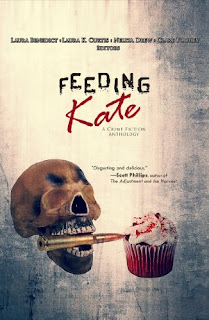by Linda Rodriguez
When a group of writers decided on
Twitter to put together an anthology to benefit our friend Sabrina
Ogden and the Lupus Foundation, I was in on it from the start. After
all, I love Sabrina, and I deal with lupus every day myself. So we
called it Feeding Kate since Kate is Sabrina's blogosphere
nickname.
https://www.amazon.com/Feeding-Kate-Crime-Fiction-Anthology-ebook/dp/B00B6UMGSM
The two main characters in my story,
“Rivka’s Place,” could hardly be more different. They are a
true odd couple of disparate ages and experiences and yet with great
respect for one another and love. I’m a big believer in courage and
in love.
One, Rivka, is an elderly Holocaust
survivor, a woman who refuses to be bullied as her shop’s
neighborhood becomes more and more dangerous and insists on helping
everyone around her. The other, C.J., came of age many decades after
World War II by killing two men as his father had trained him to do,
only to learn that everything he’d been taught was a lie, a man who
wants nothing more than to be left alone in peace to do his work,
read, and hide from his memories and those who hunt him.
Where did this bizarre partnership of
Rivka and C.J. come from?
I gave Rivka a background similar to
that of a well-known Kansas City woman, who had escaped from the
death camps of Nazi Germany twice as a child and had indeed insisted
on continuing to run her bakery in a deteriorating neighborhood,
feeding many who couldn’t afford to buy her goods. She’s dead
now, and Rivka looks and sounds nothing like her. Rivka came out of
the folds of my brain, but her background owes a debt to this
remarkable real woman I never met. I have always found her story
inspiring. As I have found the stories of so many who live with lupus
an inspiration.
To my knowledge, however, there is no
one anywhere remotely like C.J. He sprang full-blown into my mind and
demanded to be written. I have often wondered what would happen with
a young person who’d grown up in one of these cults or cult-like
families, indoctrinated in fear of civilization and government,
trained to defend the family against that “dangerous” government,
if that young person later learned that everything he or she had been
taught was a lie. C.J., I suspect, arose from these idle wonderings.
Bringing the two of them together left
me in a quandary when I first tried to write this story. Where could
it go? How could it end? I didn’t want to lose either of these
people I had come to value as I created them, but I didn’t see any
way that this could end well. These two characters were on a
collision course with tragedy. Eventually, I wrote the ending scene
through tears. Yet in some ways it is a happy ending because each
person is true to her and his inner self.


I had a dear friend with lupus who died in 2012. We e-mailed back and forth on all manner of subjects: travel, food, mysteries (she introduced me to Murder by the Book in Houston), and the agonies and joys of raising teenagers and standard poodles. I admired her perseverance and determination during her many hospitalizations. And I heeded her frequent admonitions to seize an opportunity without hesitation. I miss her very much.
ReplyDeleteMargaret, your friend sounds wonderful. I'm so sorry for your loss. I lost a best friend like that (from cancer) in 2009, and i still miss her grievously. My lupus has taught me to seize the day--when I can--and forced me to learn to pace myself.
ReplyDeleteI am impressed by you, your friends, and your characters finding ways to help despite obstacles, something we're all going to need to do more of. A college friend said he didn't feel he could change the world, but he could make his own corner of it better. His work has made a difference to many, as does yours. Hugs <3
ReplyDeleteMary, thank you. (This is a late reply because I'm at a conference where my computer won't let go online because the hotel wifi isn't secure. I'm only on right now because I'm using a friend's for a few moments.)
ReplyDelete